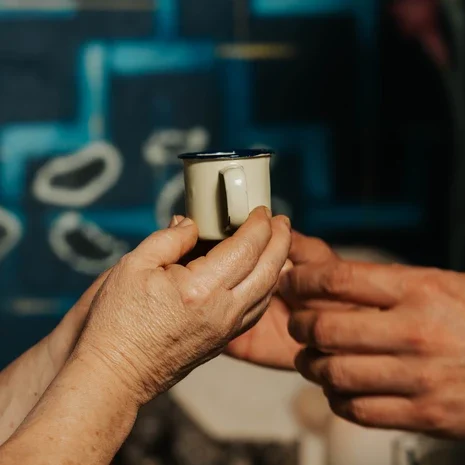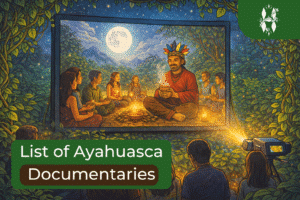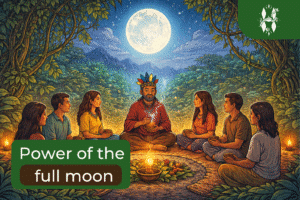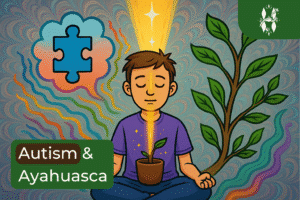Ayahuasca can be a profound catalyst for healing and transformation, but it demands careful consideration of safety and readiness. The contraindications outlined in this article—from medical conditions and medication interactions to emotional preparedness—exist to protect individuals from potentially serious harm.
Key takeaways:
- Medical safety first: Conditions like heart disease, epilepsy, and certain psychiatric disorders require absolute caution
- Medication interactions can be life-threatening: Never combine ayahuasca with SSRIs, MAOIs, or stimulants without proper medical guidance
- Emotional readiness matters: Approaching ayahuasca with genuine intention, personal motivation, and willingness to do ongoing work is essential
- Individual assessment is crucial: Every person’s situation is unique and requires professional evaluation
Table of Contents
FAQ
Who should not drink Ayahuasca?
People with certain medical or psychiatric conditions, or those taking contraindicated medications, should not drink Ayahuasca. This includes (but is not limited to) individuals with heart disease, epilepsy, severe respiratory illnesses, schizophrenia, bipolar disorder, or borderline personality disorder.
What are the medical contraindications for Ayahuasca?
Medical contraindications include (but are not limited to) cardiovascular disease, severe respiratory illness, epilepsy, and recent major surgeries. These conditions can increase the risk of serious complications during an Ayahuasca ceremony.
Can people with psychiatric conditions drink Ayahuasca?
Not all psychiatric conditions are strict contraindications. Severe conditions such as schizophrenia, bipolar disorder, and borderline personality disorder are considered unsafe, as Ayahuasca can destabilize them. Other conditions like depression or PTSD may be approached more cautiously, depending on the individual and the support provided.
Is it safe to drink Ayahuasca if I take antidepressants?
Most antidepressants, especially SSRIs, are unsafe with Ayahuasca because they can cause dangerous interactions like serotonin syndrome. Never stop or adjust your medication on your own—consult a qualified doctor familiar with Ayahuasca.
Can I take Ayahuasca while on ADHD medications like Ritalin or Vyvanse?
ADHD stimulants such as methylphenidate (Ritalin) or lisdexamfetamine (Vyvanse) are contraindicated with Ayahuasca. They overstimulate neurotransmitters and may cause life-threatening blood pressure spikes when combined with the MAOIs in Ayahuasca.
Do I need to stop all medications before drinking Ayahuasca?
No. A common misconception is that you must stop all medications. In reality, some medications are dangerous to combine with Ayahuasca, while others must be continued for safety. Always consult a doctor experienced with Ayahuasca to determine what applies in your case.
Can Ayahuasca be dangerous after surgery?
Yes. Drinking Ayahuasca shortly after surgery is unsafe because your body is still healing, and the strain of the medicine can complicate recovery. Always allow enough healing time and consult a doctor before considering a ceremony.
Is Ayahuasca safe for people with autism, OCD, or PTSD?
It depends on the individual. While these conditions are not strict contraindications, they often require specialized retreat settings and tailored support. For some people with autism, severe OCD, or complex PTSD, a standard retreat may not provide the right environment. Careful evaluation of each person’s situation is essential.
What Is Ayahuasca?
From a Western perspective, Ayahuasca is a psychoactive brew traditionally prepared from two Amazonian plants: the Banisteriopsis caapi vine, which contains natural MAOIs, and the Psychotria viridis (chacruna) leaf, which contains DMT. Together, these plants create a visionary medicine that alters consciousness for 6–8 hours. Cleaveland Clinic
From the indigenous viewpoint, however, Ayahuasca is far more than a chemical combination—it is a master plant teacher. For centuries, healers have described her as a conscious spirit who helps cleanse the body, illuminate hidden aspects of the psyche, and guide people toward deeper understanding of their lives. In this way, Ayahuasca is not only medicine but also a teacher, offering lessons in healing, clarity, and connection with nature.
If you’re new to the medicine, start with our full guide on What is Ayahuasca to understand both its scientific and indigenous roots.”
What Are the Benefits of Ayahuasca?
Ayahuasca is often described as a powerful tool for healing and self-discovery. From a scientific perspective, studies suggest it may reduce symptoms of depression, anxiety, and PTSD, while promoting neuroplasticity and emotional regulation. Participants often report increased mindfulness, improved relationships, and a greater sense of purpose.
From the indigenous viewpoint, the benefits go beyond psychology—Ayahuasca is seen as a spiritual teacher that cleanses the body, clears energetic blockages, and reconnects people with nature and community. Many describe it as a medicine that helps them release what no longer serves them and gain clarity about their life path.
“For a deeper perspective on how the medicine can continue working months or even years later, see our blog on the long-term effects of Ayahuasca.”
Contraindications
Ayahuasca can offer profound healing, but there are medical and psychological conditions, as well as medication interactions, that make it unsafe or inadvisable for certain individuals. These contraindications should be evaluated in consultation with a medical professional.
Physical and Medical Contraindications
- Cardiovascular disease & certain respiratory disorders: Ayahuasca increases heart rate, blood pressure, and cardiac workload temporarily. For people with heart disease, uncontrolled hypertension, or severe respiratory illness, these effects present real risk. PMC. We cover the topic “Can You Die Drinking Ayahuasca,” fully here
- Recent surgeries or major medical procedures: Bodily stress, healing wounds, and general metabolic demands may be compromised if one ingests a strong psychoactive brew too soon after surgery. Repair and recovery should be sufficiently advanced.
- Epilepsy or seizure disorders: Because Ayahuasca can cause changes in autonomic functions and possibly lower the seizure threshold, people with epilepsy or a history of seizures are at elevated risk. UConn
Psychiatric / Mental Health Contraindications
- Psychotic disorders, schizophrenia, and a history of mania (e.g., Bipolar Disorder): Several case reports and systematic reviews caution against Ayahuasca in persons with psychotic conditions or bipolar disorder, because of risk for triggering mania or psychosis. Springer
- Borderline Personality Disorder: Due to the emotional instability, impulsivity, and challenges with self-regulation that characterize this condition, we advise against participating in Ayahuasca ceremonies. The intensity of the experience can be destabilizing, and other therapeutic approaches are generally recommended.
People with psychiatric conditions like schizophrenia or bipolar disorder face higher risks — learn more in our article Can Ayahuasca Cause Psychosis?
Medication Interactions
- Antidepressants (especially SSRIs, SNRIs, MAOIs): Ayahuasca brew contains MAO inhibitors (from the caapi vine) which prevent breakdown of monoamines. Combining this with medications that raise serotonin (like SSRIs) can lead to serotonin syndrome—a potentially life-threatening condition. ResearchGate
- ADHD stimulants: Medicines that increase dopamine or norepinephrine, when combined with MAO inhibitors, carry risk. Stimulant medications should be paused or tapered under medical supervision.
- Other medications: Some medications must actually be continued, because stopping them indiscriminately can cause severe withdrawal, sudden destabilization, or worsen underlying conditions. The idea that “you must stop all medication before Ayahuasca” is incorrect and dangerous. Cleveland Clinic
DISCLAIMER: It’s important to note:
- Every individual’s situation is unique—factors like medication dosage, duration of use, general health, family psychiatric history, and emotional stability matter a lot.
- Stopping or modifying any psychiatric or other medication must always be done with a qualified doctor. Sudden discontinuation can be unsafe.

Find out if Ayahuasca is right for you
- Will you be safe physically and emotionally?
- How will you be supported in the ceremony?
- How do the facilitators handle difficult situations?
- How will you be able to process the experience?
- You want change, but will your life be unrecognizable after Ayahuasca?
+ 13 things to consider before drinking Ayahuasca?
A Note on Individual Safety
This article highlights the most common contraindications for drinking Ayahuasca, but it does not include every possible medical condition or circumstance. Factors such as medications, psychiatric history, and overall health vary widely from person to person. What may be safe for one individual could be dangerous for another. For this reason, each case must be evaluated individually, ideally in consultation with a qualified medical professional who understands both your health history and the specific risks of Ayahuasca.
Disclaimer: This content is for informational purposes only and should not be taken as medical advice. It does not replace consultation with a licensed healthcare provider. Always seek professional guidance before making decisions about your health or participation in an Ayahuasca retreat.
Lack of Emotional Readiness
External Pressure and Coercion
Ayahuasca requires genuine personal motivation. When individuals participate because others have pressured them, they enter the ceremony with internal resistance and inadequate psychological preparation.
Someone drinking ayahuasca to appease a partner or stop persistent encouragement approaches the medicine with conflicted energy, making the experience unnecessarily difficult and less beneficial. They may also struggle to handle what surfaces (during or after the ceremony) – difficult emotions, traumatic memories, or challenging insights they weren’t prepared to face or integrate afterward.
True readiness requires personal recognition of a need for healing, not trying to fulfill others’ expectations. Authentic preparation involves personal choice and willingness to engage with whatever the medicine reveals.
Safe and transformative experiences start well before the ceremony — see our guides on Ayahuasca Preparation and Ayahuasca Intention.”
Recreational Seeking and Spiritual Tourism
People approaching ayahuasca as a psychedelic adventure or “looking for a trip” often underestimate its intensity and therapeutic nature. Unlike recreational substances, ayahuasca frequently brings up challenging material – suppressed traumas, difficult emotions, or confronting personal patterns. Someone seeking a “fun trip” may be unprepared for the emotional work that emerges.
The “bucket list” mentality is particularly problematic because it treats a sacred medicine tradition as a consumer experience. This approach often lacks the respect, preparation, and integration commitment that meaningful healing work requires.
Looking for a Quick Fix
Many people approach ayahuasca after hearing transformative healing stories, hoping for immediate relief from their struggles. This expectation fundamentally misunderstands how the medicine works – ayahuasca is not a magic cure that erases life’s difficulties in a single ceremony.
Rather than providing quick solutions, ayahuasca often reveals the depth of wounds needing attention and presents what many describe as “homework” – insights about patterns and behaviors requiring ongoing work. The medicine serves as a guide, showing where healing is needed, but the actual transformation must be undertaken through sustained personal effort.
No external force can do this inner work for someone else. Those seeking immediate fixes often leave ceremonies disappointed by the amount of work revealed rather than the instant relief they expected.
Not Ready to Take Responsibility or Change
Ayahuasca brings uncomfortable awareness of toxic patterns, unhealthy relationships, and destructive behaviors. Once someone gains this clarity, continuing these patterns becomes significantly more difficult and psychologically painful.
This heightened awareness demands action. People who aren’t prepared to examine their role in their own suffering, or who resist making necessary changes, often find themselves stuck – too aware to continue old patterns comfortably, yet unwilling to do the required work.
Ayahuasca works best for those ready to take honest responsibility for their life circumstances and committed to making concrete changes. Without this readiness, the insights gained can become a source of additional suffering rather than healing.
Drinking Ayahuasca in Difficult Times
Contrary to common belief, yes, Ayahuasca can be meaningful during hard seasons of life. People often approach it in moments of grief, crisis, or deep questioning—and when done with intention, support, and clarity, many report profound transformation. The key is that the person knows why they want the medicine, understands what Ayahuasca is, and is willing to commit to the healing journey. It’s not about escaping pain but meeting it with courage and humility.
In many documented cases, Ayahuasca has helped individuals in difficult times access suppressed emotions, reframe trauma, and find new direction. For example, some participants describe that by allowing painful feelings to surface and integrating them in a safe ceremonial container, they experience healing that ordinary therapy couldn’t reach.
Read more in our blog on Drinking Ayahuasca in Difficult Times.”
Conclusion: Should You Drink Ayahuasca?
The decision to drink ayahuasca should never be taken lightly. It requires honest self-assessment, medical consultation, and deep consideration of your motivations and readiness for the healing journey ahead.
If you’re considering ayahuasca, take time to thoroughly evaluate these factors with qualified professionals. When approached with proper preparation, respect, and safety measures, ayahuasca can offer the profound healing and insights that have made it a sacred medicine for centuries.
Your safety and wellbeing are paramount—honor them by making informed, responsible decisions about your healing journey.
If you are interested in a medically supervised retreat in Colombia, visit Ayahuasca-Retreat.com to learn more about Harmonica Retreats and our upcoming offerings.





